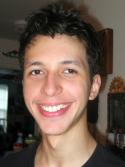

Ben Colon ’12
Major: Theatre and Dance
Thesis Advisor: Connie Congdon
Tell me about your thesis.
My thesis is a two-part playwriting thesis. The first part consists of writing a play [“The Freedman’s Son,” which was staged in November] and the second part consists of writing about the writing process. I’m working on the second part right now.
Can you talk a bit about the play for the first part of your thesis, “The Freedman’s Son”?
“The Freedman’s Son” is a play set in Ancient Rome written in contemporary language. There is one freedman’s son (son of a former slave), Lucius, who has become a politician, but then there’s a childhood friend of his who’s named Titus, also a freedman’s son, but who’s still bumming around and leeching off his friend, Ransom, a successful upper-class businessman patrician. Titus hears that Lucius has become a governor, so he goes to him for a job, and they sort of reunite because they had a falling-out before. Lucius agrees to let Titus work for him as the guy who sorts out his mail, which leads the lives of those involved to go from bad to worse. That’s all I’m going to say for now.
That’s an intriguing plot. How did these ideas come about?
I hadn’t gone in thinking that I wanted to delve into this or that, it just ended up happening, as snooty or artsy-fartsy as that sounds. The one thing I intended was to have some sort of power-dynamic, where there is a friendship between an upper-classman, Ransom, and a lower-classman, Titus. Ultimately, Ransom would have to make a choice between his responsibilities or duty to a life of consequence and his former friendship with Titus. That was the one thing that I wanted to explore. The rest sort of happened.
What about the setting? Why ancient Rome?
Well, at some point at Amherst, I was considering majoring in Classics, but, for one reason or another, I didn’t end up becoming a Classics major. And then when I was writing this play, I had no particular setting in mind at all. I would write draft after draft, and my thesis advisor, Connie, would tell me that the setting wasn’t working, to try to find something else. I needed to find what the world of the play was. I felt uncomfortable in the hodge-podge of worlds I was making up, so I decided to set it in a time period I was familiar with: ancient Rome. My thesis advisor, however, was very much against it, and for fair reasons, too. But I liked my setting more than the setting she was proposing and in the end everything worked out. Connie eventually liked my ancient Rome.
Can you speak a little to the writing process for your play?
I wrote the play during the summer. I came to Amherst. I lived in Marsh. I had a little job to sustain me, and I took out a loan, but I was here writing the play every day. The thing is, it would be draft after draft. It was really an act of discovery. Halfway through a draft, I would realize, oh wait, Ransom’s a businessman, not a politician, so I would go back to the first scene and rewrite it as if he were a businessman. Sometimes my explorations would lead to dead ends, though. The writing process was lonely, stressful and sad. I would go to Starbucks — and I don’t even like coffee — until it was 11 p.m., since none of the other buildings were open, and just write. There were days when I would write and write. I pretty much knew what I wanted to write, it was just a matter of how long my body could stay up before I collapsed. Every other week, I’d meet with my thesis advisor, and she’d look it over, she’d give criticism, and I’d voice my concerns. I was editing while the play was being rehearsed. Sometimes, the director, Jenney Shamash, would tell me a certain monologue wasn’t working, and so I’d fix it. I made cuts the day before opening night, that’s how deep into the process I was making edits.
What have people’s reactions been about the play?
Overall, it’s been good. Though some argued about why it was set in Rome or pointed out unanswered questions that kept bugging them about the characters. It was a negative stuff, but it was very civil, and if I rewrote the play, I would take many of those things into consideration. The positive stuff, though, has been watching the show with audience, and hearing people gasp when the executioner comes onto the stage, or laugh at jokes or hearing people’s comments. Reactions like that really touched me.
Do you have any words of advice for students interested in writing a thesis?
An upperclassman told me once, only write a thesis if it’s something you actually really care about and with a professor you like, because it’s extremely stressful and painful. I’ve poured tears, blood and sweat into my play and I know other people are doing the same for their theses. It’s a lot of work, and when it’s something you really care about, it makes it that much easier to get up and do the work. This is something I’ve really enjoyed, and I hope other people feel the same about their work too.